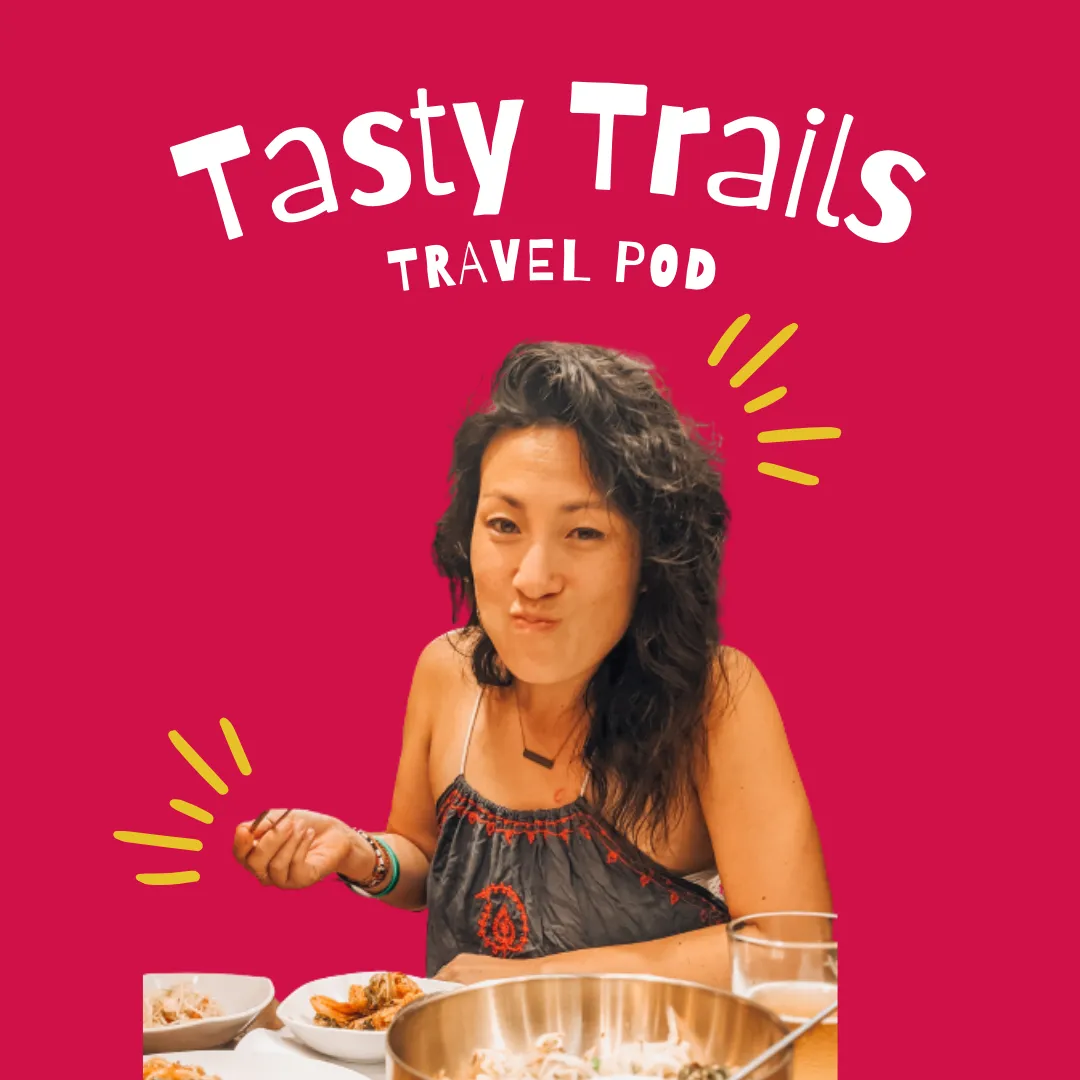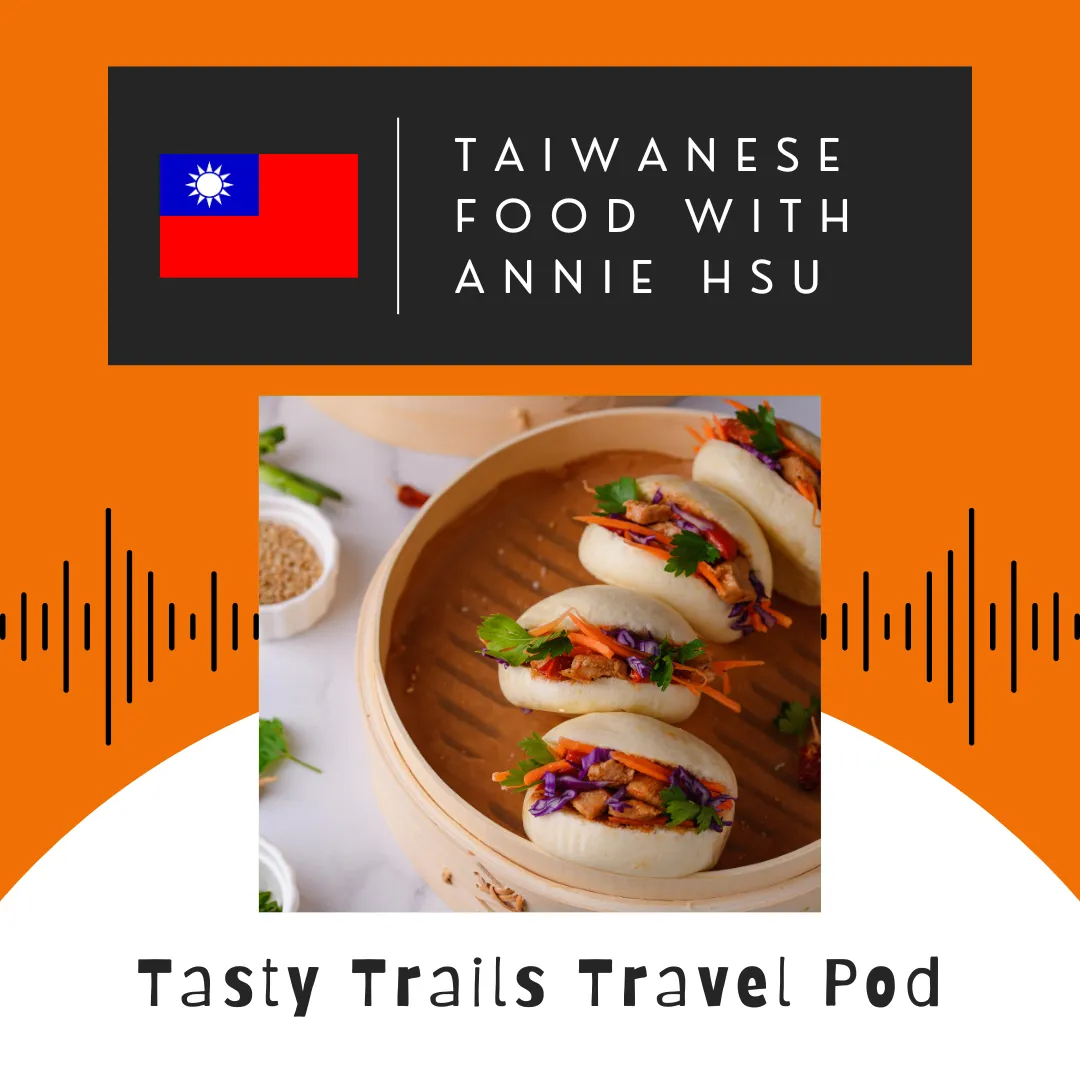PODCAST
Tasty Trails Travel Pod
Listen & Subscribe

About the pod
Tasty Trails Travel Pod is all about getting to know new places and cultures, and we're doing it through food.
Food is a universal language. It is one of the best ways to connect with people, to share stories and to make memories.
Through the podcast we meet people from all over the world who share their culinary expertise along with their culture and how we, as travelers, can explore and get to know their cultures better when we visit.
Join us as we dive into a world of flavors and uncover the stories behind your favorite dishes. So tuck in and let’s go!
Bon appetit!

Taiwan with Annie Hsu
Introduction:
Annie Hsu is a Taiwanese who has been in the food industry for almost a decade. She is currently in the wine and pastry sector.
She will chat and share with us about Taiwanese food and Taiwan, an island close to Japan and next to China.

If you want to listen to the whole interview with Annie you can find it below!
Overview of Taiwanese Food
Taiwanese cuisine is like comfort food. Taiwanese eat plenty of rice and noodles, although they usually enjoy various vegetables and seafood since the country is an island itself. The cuisine has a distinct sweet taste.
Taiwanese food is a combination of sweet and savory. It's a blend of local, regional, and international influences. Taiwanese cooking is also fun because it combines different ingredients with different food cultures. Different Taiwanese cities have different dishes, which are the staple food of different Taiwanese communities. The cuisine is really famous, and it is a hallmark of the world's street food.
“For me, our cuisine is fun in some way. We mix different kind of ingredients with different food cultures. But somehow, the cuisine is really special because of our ingredients, too.” Says Annie in her description of Taiwanese cuisine.
Taro is a crucial ingredient in Taiwanese cuisine. It's a root vegetable from Taiwan and South Asia. Some people add this sweet and savory vegetable to their noodle dumplings or braid it. You can also make it into a custard cream and spread it over a cake.
There is a strong culture of street food in Taiwan. Street food is one of the most unique aspects of Taiwanese food culture. Taiwanese have night markets and food stalls all over the country. For example, Taipei has a huge night market that is almost similar to a tourist night market.
In Taiwan, there is a link between the street food culture and the temple culture. There are countless street food stalls around every temple. Locals love to have a few bites after prayers while socializing. You can visit a temple like the Qilong temple and enjoy some really great street food around this temple.
Another popular night market is the Liu He Ye Shi. The street food here has a southern Asian flavor. It consists mostly of fried foods, but there is also unfried food like stinky tofu. The fermented dish has a potent smell and a distinct delicious taste, similar to the American version of blue cheese.
Taiwanese Bubble Tea
Taiwanese drink plenty of tea and have many tea bars on the streets. Bubble tea is the most famous Taiwanese tea variety. Although the Taiwanese got it from Hong Kong, they put a bit of tapioca peel inside the tea, converting it into bubble tea. In Taiwan, bubble tea is equivalent to coffee in Europe. Bubble tea is affordable because you can have a huge cup for as little as two euros.

What is the Dragon Boat Festival in Taiwan?
The Dragon Festival originates from the story of a man who made an effort to advise a Chinese emperor. The emperor didn't take his advice, and out of frustration he threw himself into the river to prove his advice was valuable. In his remembrance, people started throwing rice dumplings into the river to discourage the fish and other marine creatures from consuming his body.
Taiwanese host the Dragon Boat Festival annually. They mark the festival by racing dragon boats down the river while drumming. Different teams participate in the drumming as people row dragon boats and celebrate together. It is one of the most fun events in the Taiwanese calendar. The event takes place around summer.

To join the list of locals participating in the Dragon Boat Festival, you must enroll and train in boat rowing with a club. Lessons start early in the morning, and the dragon race takes part once annually. The event features dragon balls. Each dragon ball has a unique design from the other. The ball looks like a real dragon. Participants compete to catch the flag in front of the Dragon. The winner is actually whoever catches the flag.
Chinese New Year foods
Taiwanese culture borrows so much from Chinese culture. The Taiwanese people also observe the Chinese New Year. It's an essential event as families gather together to celebrate the harvest on New Year's Eve. Taiwanese offer a feast to show gratitude to God for the abundant food supply.
Every food Taiwanese eat during the Chinese New Year has a symbolic meaning. For instance, they eat dumplings every New Year. The shape of the dumpling resembles the shape of the silver in the Ancient Chinese God. Everyone needs to eat a dumpling every Chinese New Year. The more dumplings you consume, the more luck and money you have.
Taiwanese also have steamed fish on their tables during the Chinese New Year. Steamed fish symbolize abundance and attract a blessing of abundance. Taiwanese believe the more steamed fish you eat, the more fish you will catch that year. You can use any fish species during the Chinese New Year but must serve it whole.
Chicken symbolizes prosperity and good luck in Taiwanese culture. It is a welcoming dish for the Chinese New Year. Taiwanese serve whole chicken to represent wholeness and unity. The whole chicken also signifies a great start and end of the year. Taiwanese usually roast or braise a whole chicken with soy and ginger and offer it to gods and ancestors for protection and blessings. Shrimp is synonymous with the Chinese New Year. It symbolizes happiness and liveliness. Shrimp also signifies good fortune. Taiwanese include shrimp in their New Year feasts to attract luck and good fortune.
Final Word About Taiwanese Food
Taiwanese cuisine is famous worldwide. It blends aspects of Chinese and Western influences. It’s symbolic and suitable for different events and ceremonies. Annie helps us understand why Taiwanese cuisine is wildly famous and unique.
If this episode ignited your travel spark, check out traveltrail.com. I help simplify international travel with stress-free research, planning, and advice because you shouldn't need a vacation to plan your vacation.
Connect with Annie and Cravee on Instagram @cravee.tw
Sign up for the newsletter!! Each month I'll be sending out a newsletter with insider tips Sign up HERE!
***Looking to experience the flavors we've explored firsthand?
Skip the stress of travel planning and work with a trusted professional to take care of all of that for you!
Travel Trails specializes in crafting unforgettable travel experiences tailored to your taste for adventure.
Don’t miss out on tasting these delicious dishes because you don’t have the time to plan.
Visit https://travel-trails.com/ to learn more and follow
@TastyTrailsTravelPod and @Travel.Trails___ on Instagram to stay up to date on episodes and all things food & travel
Apply to be a guest
If you have a deep connection to a specific culture and food, we want to hear from you!
© Copyright 2024 Travel Trails, LLC
